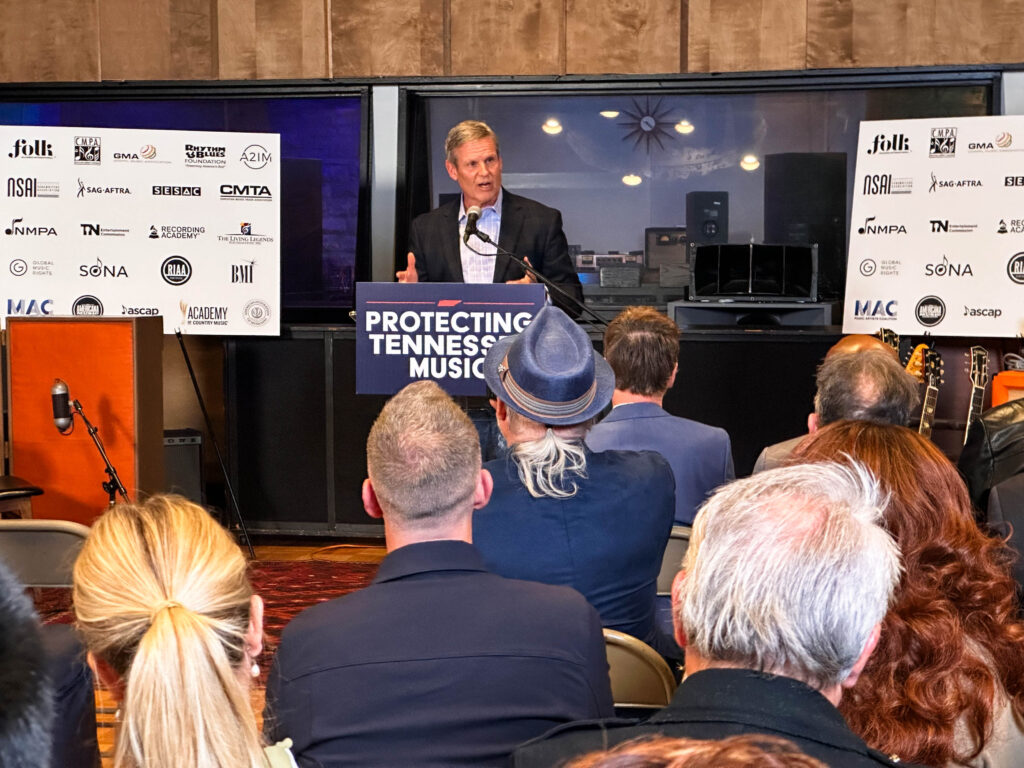
It’s not every day that Tennessee Gov. Bill Lee convenes a who’s who of the state’s music industry. But he did on Wednesday at historic RCA Studio B to announce that Tennessee will be the first state to pursue legislation on artificial intelligence in music.
They’re calling it the ELVIS Act, which is far easier to remember than what that stands for: the Ensuring Likeness Voice and Image Security Act.
Lee explained that the acronym points back to measures the state adopted to protect the likeness of “The King.”
“The original legislation that was put in place was in part,” he said, “because of the issue of the robbing of the Elvis identity.”
But the coalition of industry professionals on hand to show their support was even broader than the reach of Elvis’s legacy. Posters flanking the podium bore the names of a host of trade organizations involved in music and entertainment in Tennessee and across the nation, from the Recording Academy to the Gospel Music Association, Folk Alliance International, the Americana Music Association, the Nashville Songwriters Association International, the Rhythm and Blues Foundation and SAG-AFTRA.
Acting as the de facto master of ceremonies, the head of RIAA, Mitch Glazier, spent nearly five minutes on a roll call of the institutions, record companies and music-makers present from an array of genres and specialties based in Nashville and Memphis alike.
When the crowd of artists, musicians, songwriters and producers were asked to gather around the governor and state legislators for a photo op, photographers struggled to fit them all into a single frame.
During his comments, Lee emphasized the iconic status that Tennessee music-makers enjoy the world over. That wasn’t merely a gesture to win over his audience — though it certainly played well in the room — he was also making the case that the distinctiveness of their work deserves legislative safeguards.
“Every one of you who is an artist or an engineer or a producer,” he said, “you have a gift and it’s unique to you and it’s very important that not be copied, stolen, mocked. It’s very important that that be protected.”
“We have laws in place that have that have protected up to [now],” he went on. “But technology changes and new protections are necessary in artificial intelligence.”
Particularly over the last year, debate has raged across the world over how AI should be used in music, and it’s far from a one-dimensional issue.
On one front, there’s concern about AI platforms using copyrighted material to train their algorithms without permission. Then there’s the uncertainty over whether copyright law could or should be expanded to cover compositions made by human creators working in concert with AI.
But what’s stoked the greatest fear is the unauthorized use of performers’ vocal likenesses. The industry is still haunted by the specter of a strikingly convincing, but completely faked “collaboration” between Drake and The Weeknd going viral last spring.
Mostly, the governor and the others who took the podium spoke of the need to protect artistic input in the broadest possible terms, but Tennessee’s legislation will take aim at the latter issue. The governor’s news release promised “protections for songwriters, performers, and music industry professionals’ voice from the misuse of artificial intelligence,” and similar language peppered the official comments, including those delivered by guitar-shredding, country-pop artist Lindsay Ell.
“No one wants to hear their voice or see their image taken without permission or used out of context,” she argued, reading from notes she’d prepared. “This landmark legislation will help protect artists against those threats and set the stage for protection nationally and around the world. Y’all, we are making an example for the entire world. AI deepfakes threaten creators’ livelihoods, steal their authenticity, and break legitimate bonds between artists and their fans.”
Legal experts have predicted that addressing the use of performers’ vocal likenesses — the signature sound of a singer’s timbre, tone, phrasing and inflection — is the most promising front in the effort to adapt to the increasing power and presence of AI.
The “right to publicity” laws that already exist in some states, including Tennessee, can be amended to regulate the use of a person’s voice, in addition to their name and image.
The announcement of the Tennessee legislation echoed the recent SAG-AFTRA strike, where actors fought for control of how their voices and images can be used. And even though Tennessee is the first to pursue measures like these on the state level, the move comes months after the U.S. Senate introduced the Nurture Originals, Foster Art and Keep Entertainment Safe Act (i.e. NO FAKES Act) and hours after the U.S. House rolled out the No Artificial Intelligence Fake Replicas and Unauthorized Duplications Act (i.e. NO AI FRAUD Act).

